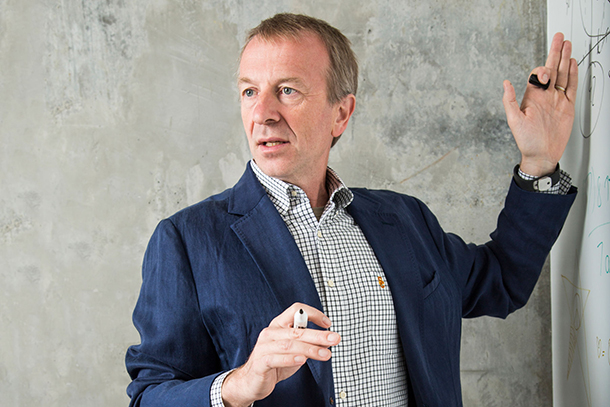
Fear has power. Power to harm body and soul. Power to motivate.
Peter Kuhn first learned its power as a boy growing up on a farm in Bavaria. The family ran an orchard of apples, pears and plums. The town of Unterpleichfeld had perhaps 1,000 inhabitants, “if you included some of the farm animals,” Kuhn said. It was a charmed childhood, except for cancer.
Kuhn is a cancer researcher at the USC Michelson Center for Convergent Bioscience. He studies how cancer invades the human body.
One day, his mother, Rosi, found a lump in her breast. Cancer. It was foreign to her body and her temperament. She was barely 50, jovial and hardworking in the orchard.
“But the fear in her face for her future when she found out. I remember that. I grew up with that in my life. You never forget that,” Kuhn said.
His mother underwent an experimental treatment to control the tumor. She survived. But the fear persisted. Thereafter, any ache or pain triggered dread.
“I would see it in her eyes, her very first thought was, ‘It’s back, isn’t it? Cancer is back!’ So you ask yourself as a young man, ‘Why is that? Why does that happen? What can be done about it?’”
Another woman in town was diagnosed with breast cancer. She was treated at the same time using the same approach at the same clinic. The two women became friends, bound by circumstance and disease. The other woman died. Before she passed, she told Rosi, “Tell Peter to keep doing what he’s doing, to keep studying science, because someday it will lead to something good that can help women like us.”
He did.
Peter Kuhn’s journey begins
At 24 years old, Kuhn was studying physics in Wuerzburg, the German town where his mother was treated. He came to America as an exchange student for 10 months to experience the culture and earn a master’s degree before going back to Europe. He attended a lecture in New York that showed the power of targeted drug design, which prompted him to stay and study biomedicine. He focused on blood as the superhighway of the body.
A grape-size tumor contains about 1 billion cancer cells. It starts in one place, a beachhead in the body, and begins to spread via bloodstream. A patient begins to feel pain, but by then its virulence grows.
“I grew up with that worry, conscious of this constant fear because pain is indeed often the first indication of metastatic progression,” Kuhn said. “Even though physicians monitor patients, still too often the first indication the disease has returned and spread is pain. It is one of these obvious and gaping holes in our scientific understanding of cancer.”
Kuhn developed a “liquid biopsy” to spot cancer cells in the circulatory system. His research took him from a faculty position at Stanford University to the Scripps Research Institute in La Jolla. He then came to USC to help anchor the USC Michelson Center. From his office on the third floor of Michelson Hall, he can see much of the University Park Campus, downtown Los Angeles and the San Gabriel Mountains. Looking out the window, he sometimes wonders, “if we can predict how long it takes to reach LAX from USC, we ought to be able to predict when cancer comes back.”
Vital research takes place at the USC Michelson Center
In his lab at the USC Michelson Center, researchers use machine learning as the companion to the liquid biopsy to track cancer cells in the blood of more than 4,000 patients worldwide — a big data project in search of matching the right treatment to the right person to stop cancer cells from spreading.
Convergence — the focus on wicked problems requiring the blending of multiple disciplines to achieve solutions better than a single approach — is the core of Michelson research. It’s what attracted Kuhn to USC. The university’s diverse schools — engineering, cinema, gerontology, medicine, public policy, pharmacy and more — seemed a limitless galaxy of creative catalysts all waiting to converge and improve outcomes for cancer patients.
“It’s almost unlimited imagination and collaboration. The Michelson Center is the most natural and logical thing you could imagine solving big problems like cancer. Where else could I find that at a leading research institution?,” Kuhn said.
He joined USC four years ago and today he is the Dean’s Professor of Biological Sciences and Professor of Medicine and Engineering and a founding member of the USC Michelson Center. He also leads USC’s Convergent Science Initiative in Cancer (CSI-Cancer). And he is associate director of the USC Michelson Center Bridge Institute.
The first product from technology Kuhn developed became available for cancer care in 2016 for helping men with advanced prostate cancer to select the appropriate drugs. In 2018, this test became reimbursed by Medicare, making it available to thousands of patients around the country. He believes that new technologies emerging from CSI-Cancer that are patient-focused, such as ATOM-HP and CancerBase, could be the key to successfully treating patients with cancer. Better treatment decisions will require more data, more technologies, more communication and more patient support. Kuhn sees the USC Michelson Center as a solution. It’s why he came here.
Hope has power. Power to heal. The power to save.
